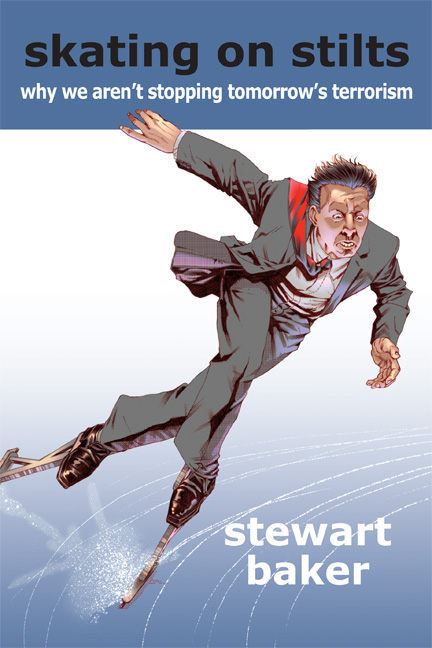By: Terresa Monroe-Hamilton

Recently, I started reading Skating on Stilts by Stewart A. Baker. He is a Partner at Steptoe & Johnson, LLP and he is a former Assistant Secretary for Policy at the Department of Homeland Security (2005-2009). What I expected was something dry and clinical. I was pleasantly surprised with Mr. Baker’s writing style. It captured my attention within the first few words and reads more like a thriller than a text on counterterrorism methodology. It would seem he has a true gift for writing…
In Skating on Stilts, Baker covers his experiences in counterterrorism before and after 9/11. He specifically examines the modern technologies we all love and covet, but that we are unwilling to sacrifice our privacy for. Baker contends that we need secure, shared databases and other counterterrorism measures that realistically assure our nation and her citizens’ safety. Biotechnology is another area that could easily run amok if steps are not taken to ensure that this technology does not fall into the hands of terrorists.
This is a thorny problem that I have worried over for years. Just how do you apply wonderful new computer and science technologies without sacrificing our individual rights? The fact of the matter is, you can’t. But I have always held fast to the precept that you cannot sacrifice freedom for safety and win. However, I certainly see Mr. Baker’s point that computer networks and such issues as sharing DNA information must be secured in some manner or we won’t just risk terrorism, we will experience it on a whole new level.
It is vital that our agencies are able to share intel with one another without an undue burden of red tape. To not do so is suicidal. Throughout Baker’s book, he covers the issue of privacy versus security and he does it in a riveting and eloquent manner. Baker has a strong concern and commitment to civil liberties and privacy. But he also has a very sane and competent view of cybersecurity and biotech issues. He provides insight into DHS and other agencies I had not previously considered and it was intriguing to say the least.
In closing, I highly recommend this book as not only a terrific read (as I said Baker is indeed gifted), but if you have ever wondered what the internal workings of the DOJ and DHS look like, this is a great way to learn about their history, struggles and triumphs. I don’t agree with everything Mr. Baker puts forth, but I also don’t have his experience or insight into what it actually takes to keep us safe. I think he is a brilliant man and attorney who has served his country honorably and probably has saved untold lives in the process. I look forward to his next book and I truly enjoyed Skating on Stilts.















